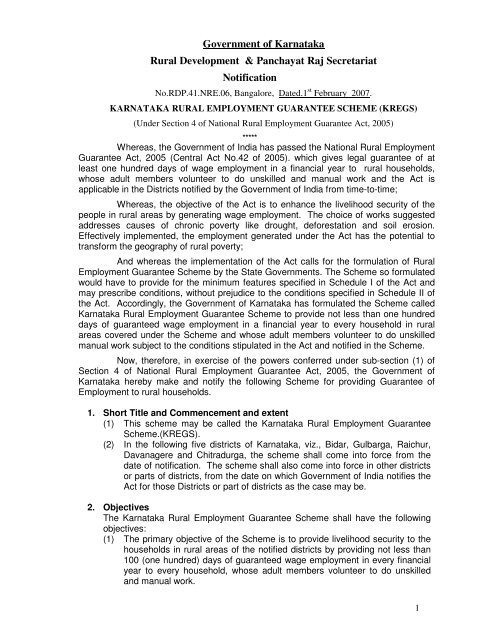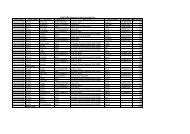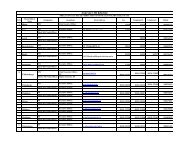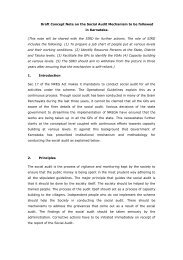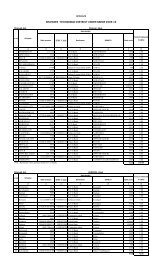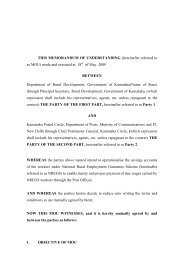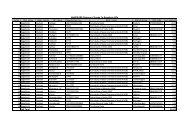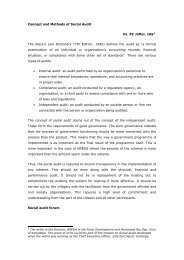Government of Karnataka Rural Development & Panchayat Raj ...
Government of Karnataka Rural Development & Panchayat Raj ...
Government of Karnataka Rural Development & Panchayat Raj ...
Create successful ePaper yourself
Turn your PDF publications into a flip-book with our unique Google optimized e-Paper software.
<strong>Government</strong> <strong>of</strong> <strong>Karnataka</strong><strong>Rural</strong> <strong>Development</strong> & <strong>Panchayat</strong> <strong>Raj</strong> SecretariatNotificationNo.RDP.41.NRE.06, Bangalore, Dated.1 st February 2007.KARNATAKA RURAL EMPLOYMENT GUARANTEE SCHEME (KREGS)(Under Section 4 <strong>of</strong> National <strong>Rural</strong> Employment Guarantee Act, 2005)*****Whereas, the <strong>Government</strong> <strong>of</strong> India has passed the National <strong>Rural</strong> EmploymentGuarantee Act, 2005 (Central Act No.42 <strong>of</strong> 2005). which gives legal guarantee <strong>of</strong> atleast one hundred days <strong>of</strong> wage employment in a financial year to rural households,whose adult members volunteer to do unskilled and manual work and the Act isapplicable in the Districts notified by the <strong>Government</strong> <strong>of</strong> India from time-to-time;Whereas, the objective <strong>of</strong> the Act is to enhance the livelihood security <strong>of</strong> thepeople in rural areas by generating wage employment. The choice <strong>of</strong> works suggestedaddresses causes <strong>of</strong> chronic poverty like drought, deforestation and soil erosion.Effectively implemented, the employment generated under the Act has the potential totransform the geography <strong>of</strong> rural poverty;And whereas the implementation <strong>of</strong> the Act calls for the formulation <strong>of</strong> <strong>Rural</strong>Employment Guarantee Scheme by the State <strong>Government</strong>s. The Scheme so formulatedwould have to provide for the minimum features specified in Schedule I <strong>of</strong> the Act andmay prescribe conditions, without prejudice to the conditions specified in Schedule II <strong>of</strong>the Act. Accordingly, the <strong>Government</strong> <strong>of</strong> <strong>Karnataka</strong> has formulated the Scheme called<strong>Karnataka</strong> <strong>Rural</strong> Employment Guarantee Scheme to provide not less than one hundreddays <strong>of</strong> guaranteed wage employment in a financial year to every household in ruralareas covered under the Scheme and whose adult members volunteer to do unskilledmanual work subject to the conditions stipulated in the Act and notified in the Scheme.Now, therefore, in exercise <strong>of</strong> the powers conferred under sub-section (1) <strong>of</strong>Section 4 <strong>of</strong> National <strong>Rural</strong> Employment Guarantee Act, 2005, the <strong>Government</strong> <strong>of</strong><strong>Karnataka</strong> hereby make and notify the following Scheme for providing Guarantee <strong>of</strong>Employment to rural households.1. Short Title and Commencement and extent(1) This scheme may be called the <strong>Karnataka</strong> <strong>Rural</strong> Employment GuaranteeScheme.(KREGS).(2) In the following five districts <strong>of</strong> <strong>Karnataka</strong>, viz., Bidar, Gulbarga, Raichur,Davanagere and Chitradurga, the scheme shall come into force from thedate <strong>of</strong> notification. The scheme shall also come into force in other districtsor parts <strong>of</strong> districts, from the date on which <strong>Government</strong> <strong>of</strong> India notifies theAct for those Districts or part <strong>of</strong> districts as the case may be.2. ObjectivesThe <strong>Karnataka</strong> <strong>Rural</strong> Employment Guarantee Scheme shall have the followingobjectives:(1) The primary objective <strong>of</strong> the Scheme is to provide livelihood security to thehouseholds in rural areas <strong>of</strong> the notified districts by providing not less than100 (one hundred) days <strong>of</strong> guaranteed wage employment in every financialyear to every household, whose adult members volunteer to do unskilledand manual work.1
(2) Creation <strong>of</strong> durable assets and strengthening the livelihood resource base<strong>of</strong> rural poor.3. State Employment Guarantee FundThe State <strong>Government</strong> shall, by notification, establish a Fund to be called theState Employment Guarantee Fund to be expended and administered accordingto the Rules.4. Funding Pattern(1) The Scheme shall be implemented as a Centrally Sponsored Scheme(CSS) on cost sharing basis between the Centre and the State in the ratio<strong>of</strong> nearly 90:10.(2) The <strong>Government</strong> <strong>of</strong> India funds shall be utilized for the following:(i) Cost <strong>of</strong> unskilled labour wages(ii) Three fourths <strong>of</strong> material component.*(iii) Administrative cost.(iv) The cost <strong>of</strong> capacity building.(v) Establishment <strong>of</strong> Programme Officer with the supporting staff.(3) The State Employment Guarantee Fund shall be spent for the following:(i) 25% <strong>of</strong> the material component.*(ii) Unemployment allowance.(iii) Administrative expenses <strong>of</strong> the State Employment Guarantee Council.(iv) Other expenses related to implementation <strong>of</strong> the scheme but notpermitted by <strong>Government</strong> <strong>of</strong> India guidelines.* Material component includes cost <strong>of</strong> material, wages to skilled andsemiskilled labourers.(4) The <strong>Government</strong> <strong>of</strong> India and the State <strong>Government</strong> may release theirshare <strong>of</strong> funds to the districts directly, based on the proposals submitted bythe District Programme Co-ordinator <strong>of</strong> that district, through the State<strong>Government</strong>. The District Programme Co-ordinator shall monitor andrelease funds to the Programme Officers, based on the demand andutilization <strong>of</strong> funds in the concerned Talukas. The Programme Officers shallmonitor and release funds to Grama <strong>Panchayat</strong>s based on the demand andutilization <strong>of</strong> funds in that Grama <strong>Panchayat</strong>s.5. Provision for Administrative CostThe administrative cost <strong>of</strong> the scheme shall be as fixed by the <strong>Government</strong> <strong>of</strong>India from time-to-time. The administrative cost includes expenditure towardsInformation, Education and Communication, capacity building, staff cost,Management Information System and Operations and Maintenance.6. Non-Negotiables(1) Every registered rural household shall be provided not less than 100 days<strong>of</strong> wage employment, on demand, in a financial year.(2) Payment <strong>of</strong> wages shall be made atleast once in a fortnight.(3) Equal wages shall be paid to men and women.(4) Contractors and labour displacing machinery shall not be engaged.(5) Only works approved by the Gram <strong>Panchayat</strong> (identified in the GramSabha) at the village level, the Taluk <strong>Panchayat</strong> at the Taluk level and theZilla <strong>Panchayat</strong> at the District level shall be taken up.2
7. Rights and Entitlements(1) Every adult member whose name appears in the Job Card shall beentitled to apply for unskilled manual work.(2) All persons belonging to a household and registered shall be entitled toemployment under the Scheme for as many days as each applicant mayrequest, subject to a maximum <strong>of</strong> one hundred days per household in agiven financial year.(3) If an applicant is not provided with such employment within fifteen days <strong>of</strong>receipt <strong>of</strong> his/ her application seeking employment or from the date onwhich the employment has been sought in the case <strong>of</strong> an advanceapplication whichever is later, he/she shall be entitled to a dailyunemployment allowance subject to the entitlement <strong>of</strong> the household atthe rate which shall not be less than one fourth <strong>of</strong> the wage rate for thefirst 30 (thirty) days <strong>of</strong> the financial year and not less than one half <strong>of</strong> thewage rate for the remaining period <strong>of</strong> financial year.(4) As far as possible the applicant shall be provided work within the village. Ifan applicant is provided employment outside a radius <strong>of</strong> five kilometers <strong>of</strong>the village where he/ she resides at the time <strong>of</strong> applying he/she should bepaid an extra 10% <strong>of</strong> the prevailing wage rate to meet additionaltransportation and living expenses.(5) Priority shall be given to women in such a way that at least one-third <strong>of</strong>the wage seekers shall be women who have registered and requested forwork.(6) In case the payment <strong>of</strong> wages is not made within a fortnight, the workersshall be entitled to receive payment <strong>of</strong> compensation as per the provisions<strong>of</strong> the Payment <strong>of</strong> Wages Act 1936(4 <strong>of</strong> 1936).(7) There shall be no discrimination solely on the ground <strong>of</strong> gender and theprovisions <strong>of</strong> the Equal Remuneration Act. 1976 (25 <strong>of</strong> 1976) shall becomplied with.(8) Workers shall be provided with work site facilities like safe drinking water,shade for children and periods <strong>of</strong> rest, first-aid box with adequate materialfor emergency treatment <strong>of</strong> minor injuries and other health hazardsconnected with the work.(9) If the number <strong>of</strong> children below the age <strong>of</strong> six years accompanying theworkers at any site is five or more, one woman worker shall be engagedto look after the children and she shall be paid wage rate.(10) In case <strong>of</strong> any injury caused to a person employed under the Scheme byaccident arising out <strong>of</strong> and in the course <strong>of</strong> his/her employment, suchperson shall be provided with medical treatment free <strong>of</strong> charge.(11) Where hospitalization <strong>of</strong> the injured worker at the worksite is necessary,such arrangements shall be made including accommodation, treatmentand medicines. The injured worker shall be paid a daily allowance not lessthan half <strong>of</strong> the wage rate required to be paid had the injured beenengaged in the work.(12) If the person employed dies or becomes permanently disabled byaccident arising out <strong>of</strong> and in the course <strong>of</strong> employment, he/she shall bepaid an ex-gratia at the rate <strong>of</strong> Rs. 25,000 or such amount as may benotified by the Central <strong>Government</strong>, and the amount shall be paid to thedisabled or legal heirs <strong>of</strong> the deceased, as the case may be.(13) In case <strong>of</strong> any personal injury caused by accident to a childaccompanying any person employed under the Scheme, such person isentitled to free <strong>of</strong> charge medical treatment for the child and in case <strong>of</strong>death or disablement, an ex-gratia as determined by the <strong>Government</strong>.3
8. Implementation Arrangements(1) At the village level the Gram <strong>Panchayat</strong> shall be the principal authority forplanning and implementation <strong>of</strong> the Scheme. The Gram <strong>Panchayat</strong> shallbe responsible for identification <strong>of</strong> the works in the Gram <strong>Panchayat</strong> areaas per the recommendations <strong>of</strong> the Ward Sabha and Gram Sabhas andfor executing and supervising such works.(2) The <strong>Panchayat</strong> Secretary shall be responsible for receiving applicationsfor registration and for issuance <strong>of</strong> Job Cards. There shall be a Village<strong>Development</strong> Assistant to assist the <strong>Panchayat</strong> Secretary in maintainingthe records and also to assist the Technical Personnel <strong>of</strong> the respectiveExecuting Agencies.(3) At the Taluk level, the Taluk Panchyat shall be the principal authority forplanning and implementation <strong>of</strong> the Scheme. The Executive Officer <strong>of</strong> theTaluka <strong>Panchayat</strong> shall be the Programme Officer at the Taluka level andhe/she shall, assist the Gram <strong>Panchayat</strong>s and the Taluk <strong>Panchayat</strong> incarrying out its functions under the Scheme. The Programme Officer shallbe provided with such additional support as may be required from time-totime.(4) The Programme Officer will have a critical role in coordinatingimplementation processes at the Taluka level. He/She will be responsiblefor scrutinizing the Grama <strong>Panchayat</strong> <strong>Rural</strong> Employment GuaranteeScheme plans, ensuring that they match with demand for employment,that implementing agencies start works on time, that the demand foremployment is met within time and workers receive their due entitlements.His important functions include ensuring the social audit by the GramSabha, disposing complaints and grievance redressal. The ProgrammeOfficer will assist the Taluka <strong>Panchayat</strong> in its functions under the Scheme.The Programme Officer shall function under the direction, controland superintendence <strong>of</strong> the District Programme Coordinator and will alsobe accountable to the Taluka <strong>Panchayat</strong>.(5) There shall be an Additional Programme Officer at each Taluk level. TheAdditional Programme Officer shall be a full-time dedicated <strong>of</strong>ficer andmay be taken on deputation or on contract.(6) At the District-level, the Zilla <strong>Panchayat</strong> shall be the principal authority forplanning and implementation <strong>of</strong> the Scheme. The Zilla <strong>Panchayat</strong> shallapprove the District <strong>Rural</strong> Employment Guarantee Scheme Plans, whichinclude the consolidated Taluk <strong>Rural</strong> Employment Guarantee Schemeplans, its own proposals and project proposals received from other LineDepartments, other executing agencies such as any local authority or<strong>Government</strong> undertaking or non governmental organization authorized bythe Central or the State <strong>Government</strong>, reputed NGO’s having a proventrack record performance, co-opertive societies with a majority shareholding by the Central or the State <strong>Government</strong> and self help groups, tounder take the implementation <strong>of</strong> any work taken under the scheme. Itshall also review the programme implementation, supervise and monitorprojects taken up at the District and Taluka levels.(7) The Chief Executive Officer <strong>of</strong> the Zilla <strong>Panchayat</strong> shall be the DistrictProgramme Coordinator for the implementation <strong>of</strong> the Scheme in theDistrict. He/She shall be assisted with such support as may be requiredfrom time-to-time.4
(8) At the State level, the Principal Secretary/Secretary, <strong>Rural</strong> <strong>Development</strong>and <strong>Panchayat</strong> <strong>Raj</strong> Department (entrusted with the charge <strong>of</strong> the scheme)shall be the State Programme Coordinator. He/She shall be assisted bythe Director and such other subject specialists and support staff as maybe required from time-to-time.(9) The State <strong>Government</strong> shall set up the Employment Guarantee Fund,provide Budget provision for and release the State share, notify <strong>Rural</strong>Standard Schedule <strong>of</strong> Rates from time to time, conduct impactassessment and evaluation studies. The State <strong>Government</strong> shall set upthe <strong>Karnataka</strong> State Employment Guarantee Council under Section 12 (1)<strong>of</strong> the National <strong>Rural</strong> Employment Guarantee Act, 2005. The <strong>Karnataka</strong>State Employment Guarantee Council shall be the advisory body for thepurpose <strong>of</strong> the <strong>Karnataka</strong> <strong>Rural</strong> Employment Guarantee Scheme.(10) Non-<strong>Government</strong>al Organizations may be involved as partners incommunity mobilization, capacity building, social audit and monitoring <strong>of</strong>processes relating to rights and entitlements <strong>of</strong> the workers.9. Registration and issuance <strong>of</strong> Job Card(1) Any adult person <strong>of</strong> a household may on behalf <strong>of</strong> the members <strong>of</strong> thehousehold apply to the Gram <strong>Panchayat</strong>, in the jurisdiction <strong>of</strong> which theyreside, for registration <strong>of</strong> their household under the scheme and forissuance <strong>of</strong> a Job Card. The application may be in a printed form(Form-1) or on a plain paper containing the names <strong>of</strong> the adult members,their age, and address <strong>of</strong> the household. The <strong>Panchayat</strong> Secretary shallreceive applications and issue a dated receipt and enter the details in theRegister <strong>of</strong> applications for Registration (Form-2), and the same shall beentered in the Register <strong>of</strong> Job seekers and employment (Form-3). Afterthat, the <strong>Panchayat</strong> Secretary shall make due enquiry and issue the JobCard.(2) An House hold Job Card (Form-4) with unique ID number will be issuedby the Gram <strong>Panchayat</strong> to the household that has been registered. The<strong>Panchayat</strong> Secretary shall also maintain these details in the House holdJob card issue register (Form-5). Stamp size photographs <strong>of</strong> the adultmembers <strong>of</strong> the household must be affixed to the Job Card within onemonth from the date <strong>of</strong> issue <strong>of</strong> the Job Card.(3) The <strong>Panchayat</strong> Secretary shall update the household Job Card at the time<strong>of</strong> payment <strong>of</strong> wages. The wage-days provided and the wages paid to theworkers shall be reflected in the Job Card and the Employment Register.(4) Addition or deletion <strong>of</strong> members eligible to seek work shall be carried outin the Job Card as and when required. The updated list shall be sent tothe Programme Officer, every month.(5) A cardholder may apply to the Grama <strong>Panchayat</strong> for a duplicate card ifthe original card is lost or damaged. The <strong>Panchayat</strong> Secretary shall verifythe case and issue a duplicate card within seven working days <strong>of</strong> receipt<strong>of</strong> the application, after collecting the fee as may be prescribed.10. Application for work and work allotment(1) Individuals/Groups <strong>of</strong> wage-seekers having Job Cards shall giveindividual or group applications, as the case may be, on a plain paper orin a printed form (Forms-6). Advance application giving details <strong>of</strong> thespecific period <strong>of</strong> employment sought in the year may also be submitted.The same person/ group may submit multiple applications provided thatthe corresponding periods for which employment is sought do not overlap.5
(2) The Grama <strong>Panchayat</strong> Secretary shall accept the applications for work.The applications shall be valid if the wage employment sought by ahousehold is at least for fourteen days and the aggregate employmentprovided to the household is not more than hundred days. List <strong>of</strong> all suchapplications shall be maintained in Employment Demand Register’(Form-7).(3) The Grama <strong>Panchayat</strong> shall direct the applicant or group <strong>of</strong> applicants inwriting (Form-8), to work in any ongoing work or by starting a new work,within fifteen days <strong>of</strong> receiving applications seeking work or from the date<strong>of</strong> work being sought in case <strong>of</strong> advance application, whichever is later.Public notices <strong>of</strong> Intimation in respect for work shall be in Form (Form-9).(4) Disabled persons may be provided wage-employment by entrustingsuitable work in the form <strong>of</strong> services that are identified as integral to theprogramme.(5) If it is not possible to provide work within the Grama <strong>Panchayat</strong> area, theGrama <strong>Panchayat</strong> Secretary shall forward the applications for work to theProgramme Officer. The Programme Officer shall coordinate with otherGrama <strong>Panchayat</strong>s within the Taluk and issue letters <strong>of</strong> employment tothe applicants in the Gram <strong>Panchayat</strong> where work is available, by markinga copy to both the <strong>Panchayat</strong> Secretaries concerned.11. Unemployment Allowance(1) If an applicant is not provided employment within fifteen days <strong>of</strong> receipt <strong>of</strong>the application seeking work or from the date on which the employmenthas been sought, in case <strong>of</strong> advance application, whichever is later, he/she can apply to the <strong>Panchayat</strong> Secretary for unemployment allowance.The <strong>Panchayat</strong> Secretary shall forward such applications to theProgramme Officer who shall, after due enquiry, sanction theunemployment allowance or reject the application as the case may be.(2) The liability <strong>of</strong> the <strong>Panchayat</strong> to pay unemployment allowance to anyhousehold shall cease as soon as one or more <strong>of</strong> the following conditionsare fulfilled:(i) The applicant is directed by the Grama <strong>Panchayat</strong> or theProgramme Officer to report for work either by himself or depute atleast one adult member <strong>of</strong> his/her household;(ii) The period for which employment is sought comes to an end andno member <strong>of</strong> the household <strong>of</strong> the applicant had turned up foremployment;(iii) The adult members <strong>of</strong> the household <strong>of</strong> the applicant havereceived in total at least one hundred days <strong>of</strong> work within thefinancial year;(iv) The household <strong>of</strong> the applicant has earned as much from thewages and unemployment allowance taken together which is equalto the wages for one hundred days <strong>of</strong> work during the financialyear.12. Type <strong>of</strong> WorksThe focus <strong>of</strong> the Scheme shall be on the following works in their order <strong>of</strong>priority:(i) Water conservation and water harvesting.(ii) Drought pro<strong>of</strong>ing (including afforestation and tree plantation).(iii) Irrigation canals, including micro and minor irrigation works;6
(iv) Provision <strong>of</strong> irrigation facility to land owned by householdsbelonging to the Scheduled Castes and Scheduled Tribes or toland <strong>of</strong> beneficiaries <strong>of</strong> land reforms or that <strong>of</strong> the beneficiaries <strong>of</strong>Indira Awas Yojana <strong>of</strong> the <strong>Government</strong> <strong>of</strong> India programme.(v) Renovation <strong>of</strong> traditional water bodies including desilting <strong>of</strong> tanks.(vi) Land development.(vii) Flood control and protection works, including drainage in waterloggedareas.(viii) <strong>Rural</strong> connectivity to provide all-weather access.(ix) Any other work, which may be notified by the Central <strong>Government</strong>in consultation with the State <strong>Government</strong>.In order to ensure that the adequate investments under EmploymentGuarantee Scheme are channelised for plantation programmes, aminimum <strong>of</strong> 20% <strong>of</strong> the value <strong>of</strong> works taken up in a Village shall be onplantation programme. Roads can be taken up as last priority notexceeding 10% <strong>of</strong> the value <strong>of</strong> all the works.13. Planning for Shelf <strong>of</strong> Works(1) The annual planning process for the next financial year should becompleted by the December end <strong>of</strong> every year, including approval <strong>of</strong> theplan by the Zilla <strong>Panchayat</strong>. The District Programme Coordinator shallprepare a labour budget for the next financial year containing the details<strong>of</strong> the anticipated demand for unskilled manual work in the district, whichshall be the basis for planning.(2) The District Programme Coordinator shall work out the value <strong>of</strong> all worksthat need to be taken up to meet the anticipated labour demand andcommunicate the value <strong>of</strong> works to be identified by the <strong>Panchayat</strong> <strong>Raj</strong>Institutions, among Gram <strong>Panchayat</strong>s, Taluk <strong>Panchayat</strong>s and Zilla<strong>Panchayat</strong>.(3) The <strong>Panchayat</strong> <strong>Raj</strong> Institutions i.e., Gram <strong>Panchayat</strong>, Taluk <strong>Panchayat</strong>and Zilla <strong>Panchayat</strong> shall be the units for maintaining the proportionbetween wage and material component in the ratio <strong>of</strong> 60:40 in respect <strong>of</strong>the works proposed by them. The material component shall includematerial and skilled / semi-skilled labour.(4) The Grama <strong>Panchayat</strong> shall facilitate conduct <strong>of</strong> Ward Sabhas andGrama Sabhas for identification and prioritization <strong>of</strong> works within theallocations indicated to it by the District Programme Coordinator.(5) The Grama <strong>Panchayat</strong> shall approve it as the Grama <strong>Panchayat</strong> <strong>Rural</strong>Employment Guarantee Scheme Plan duly showing the priority <strong>of</strong> theworks.(6) The Grama <strong>Panchayat</strong> shall forward its <strong>Rural</strong> Employment GuaranteeScheme Plan to the Programme Officer along with the indication <strong>of</strong> worksit proposes to execute by itself.(7) If the identified works are not sufficient to meet the anticipated wagedemand, the Programme Officer can call for additional proposals from theGram <strong>Panchayat</strong>.(8) The Programme Officer shall scrutinize the annual plan received from theGram <strong>Panchayat</strong> for its technical feasibility and satisfy himself that theplan meets the likely demand for employment based on the registrationsand previous experience.(9) The Programme Officer shall examine the proposals in the annual planand record observations on the proposals and submit a consolidatedstatement <strong>of</strong> proposals to the Taluka <strong>Panchayat</strong>.7
(10) The Taluka <strong>Panchayat</strong> shall propose works within the allocationsindicated by the District Programme Coordinator. The Taluka <strong>Panchayat</strong>shall assign priority to the works proposed by it. The Programme Officershall consolidate the <strong>Rural</strong> Employment Guarantee Scheme plansreceived from the Gram <strong>Panchayat</strong>s along with the proposals from theTaluka <strong>Panchayat</strong>, and submit the same to the Taluka <strong>Panchayat</strong> forapproval. The Taluka <strong>Panchayat</strong> shall maintain the priority indicated bythe Gram <strong>Panchayat</strong>s. It shall not reject the work proposed by the Gram<strong>Panchayat</strong>s, if it is within the parameters <strong>of</strong> the Act. If it is outside theparameters <strong>of</strong> the Act, then it will be returned to the Grama <strong>Panchayat</strong>sfor replacing it with a valid proposal. The Programme Officer shall forwardthe approved Taluka <strong>Rural</strong> Employment Guarantee Scheme plan to theDistrict Programme Coordinator.(11) The District Programme Coordinator shall scrutinize the plan proposals <strong>of</strong>all the Taluk <strong>Panchayat</strong>s examining the adequacy and appropriateness <strong>of</strong>works in terms <strong>of</strong> likely demand as well as their technical and financialfeasibility. He/she will also invite and examine work proposals from otherexecuting agencies such as any local authority or <strong>Government</strong>undertaking or non governmental organization authorized by the Centralor the State <strong>Government</strong>, reputed NGO’s having a proven track recordperformance, co-opertive societies with a majority share holding by theCentral or the State <strong>Government</strong> and self help groups. He/she willconsolidate all these proposals and place before the Zilla <strong>Panchayat</strong>. TheZilla <strong>Panchayat</strong> shall not change the priorities indicated by the Gram<strong>Panchayat</strong>s and the Taluk <strong>Panchayat</strong>s in their <strong>Rural</strong> EmploymentGuarantee Scheme plans. The Zilla <strong>Panchayat</strong> shall propose works withinits allocation and approve the District Employment Guarantee Schemeplan. The District Programme Coordinator shall accord administrativesanctions for all the works approved under the District EmploymentGuarantee Scheme plan. The administrative sanction proceedings <strong>of</strong> theDistrict Programme Coordinator shall clearly show the priority number <strong>of</strong>the work as indicated by the Gram <strong>Panchayat</strong> / Taluk <strong>Panchayat</strong> / Zilla<strong>Panchayat</strong> and also the details <strong>of</strong> the executing agency.(12) Each work administratively sanctioned shall be assigned a uniqueidentification number.(13) The list <strong>of</strong> works administratively sanctioned should be forwarded to theProgramme Officer who will send it to the concerned executing agenciesfor technical sanctions. The technically sanctioned works should be sentback to the Programme Officer, who shall maintain these as Shelf <strong>of</strong>Works.14. <strong>Rural</strong> Standard Schedule <strong>of</strong> RatesThere shall be a separate <strong>Rural</strong> Standard Schedule <strong>of</strong> Rates prepared for theworks taken up under the Scheme. The unit rates for different types <strong>of</strong> tasksshall be so fixed, that a worker will be able to earn minimum wages fixed byState <strong>Government</strong> from time-to-time through seven hours <strong>of</strong> work per day.15. Estimation and Technical SanctionsPreparation <strong>of</strong> Estimates, Administrative and Technical sanctions, measurement<strong>of</strong> works, shall be as per the provisions contained in the <strong>Karnataka</strong> <strong>Panchayat</strong><strong>Raj</strong> (Budget <strong>of</strong> Accounts Rules), <strong>of</strong> Zilla <strong>Panchayat</strong>, Taluk <strong>Panchayat</strong> and Grama<strong>Panchayat</strong> respectively.8
16. Execution <strong>of</strong> Works(1) At least 50% <strong>of</strong> the works in terms <strong>of</strong> cost shall be allotted to Grama<strong>Panchayat</strong>s for execution. Based on the demand for employment fromthe wage seekers the Grama <strong>Panchayat</strong> Secretary shall requestProgramme Officer to issue letters for commencement <strong>of</strong> works. TheProgramme Officer shall issue letters for commencement <strong>of</strong> works to theGrama <strong>Panchayat</strong>s, line departments or other recognized agencies,strictly following the order <strong>of</strong> priority indicated in the administrativesanction proceedings issued by the District ProgrammeCoordinator. Every Grama <strong>Panchayat</strong> shall maintain a Register <strong>of</strong> Worksfor which commencement letters are received for the financial year.(2) On receiving the commencement letter, the executing agencies shallstart the work immediately.(3) While executing the works, the norms under the Scheme shall befollowed.(4) The Muster Rolls shall be supplied by the District Programme Coordinatorto Programme Officer. Each Muster Roll shall be uniquelynumbered. The Programme Officer will issue the duly numbered MusterRolls to executing agencies, which shall maintain such Muster Rolls forevery work. The executing departments shall also maintain a stockregister <strong>of</strong> the Muster Rolls. The Muster Rolls shall be closed once aweek.17. Wages for Unskilled Labourers(1) Equal wages shall be paid to both men and women. The payment <strong>of</strong>wages shall be made atleast once in a fortnight. The district-wise averagewage earned by the workers shall also be brought to the notice <strong>of</strong> theState Council every year. The Grama <strong>Panchayat</strong> will be the single windowfor wage-payment to unskilled labourers, irrespective <strong>of</strong> the executingagency.(2) It shall be ensured that the number <strong>of</strong> days <strong>of</strong> work and payment areentered in the Household Job Card and the same shall also be entered inthe Employment Register maintained at the Grama <strong>Panchayat</strong> level. Inrespect <strong>of</strong> all villages where there is a Bank Branch or a Post Office within the village, a worker shall be assisted to open an account so that theirwages can be adjusted to their accounts.18. Closing <strong>of</strong> Works and Data ManagementThe work shall be closed by the executing agency with a completion report. EachGram <strong>Panchayat</strong> and every executing agency shall maintain a register <strong>of</strong> allworks sanctioned, executed and completed.19. Audit <strong>of</strong> AccountsAudit <strong>of</strong> the accounts under the Scheme shall be compulsory. Regular audit <strong>of</strong>accounts <strong>of</strong> Grama <strong>Panchayat</strong>, Taluk <strong>Panchayat</strong> and Zilla <strong>Panchayat</strong> will beconducted by the respective Statutory Auditors as per the Rules in vogue. TheDistrict Programme Co-ordinator shall arrange to conduct Financial Audit <strong>of</strong> theScheme accounts <strong>of</strong> the District, by the registered Chartered Accountantsempanelled by the State <strong>Government</strong>.9
20. Vigilance and Quality Assurance(1) Independent Vigilance and Quality Assurance teams shall be engaged tomonitor the implementation <strong>of</strong> the Employment Guarantee Scheme.(2) The Village Water and Sanitation Committee constituted under Section61-A <strong>of</strong> the <strong>Karnataka</strong> <strong>Panchayat</strong> <strong>Raj</strong> Act shall also function as the villageVigilance and the Monitoring Committee under the Scheme at the villagelevel21. Social Audit and Right to Information(1) Social audit shall be taken up to make the planning, implementation andevaluation <strong>of</strong> Employment Guarantee Scheme more participatory,transparent and accountable. Social audit shall not be retrospective butan ongoing process <strong>of</strong> participation to ensure that legal guarantees andentitlements flow to the workers in a legitimate way. Social audit shall bedone in three stages – before, during and after implementation. Socialaudit shall be integrated into the critical activities <strong>of</strong> EmploymentGuarantee Scheme.(2) An information Wall/Board shall be built by the Gram <strong>Panchayat</strong> at Gram<strong>Panchayat</strong> headquarters. One side <strong>of</strong> the Wall shall be painted with longterminformation like task-wise wage rates to be adopted for the year,non-negotiables, important guidelines, shelf <strong>of</strong> works identified etc. Theother side <strong>of</strong> the wall shall be updated with weekly information like workwisenumber <strong>of</strong> labour working; materials procured and consumedexpenditure etc.(3) An Officer nominated by the District Programme Co-ordinator at theDistrict level, the Programme Officer at the taluk level and the <strong>Panchayat</strong>Secretary at the Grama <strong>Panchayat</strong> level shall be the Public InformationOfficers for the Scheme, under the Right to Information Act, 2005. TheDistrict Programme Coordinator shall be the appellate authority. ThePublic Information Officers shall make available copies <strong>of</strong> the documents/registers for verification and sale on cost as per the provisions <strong>of</strong> the Rightto Information Act, 2005. The Programme Officer shall make available tothe Grama <strong>Panchayat</strong>s the estimates <strong>of</strong> the works commenced, copies <strong>of</strong>Muster Rolls, pay orders for facilitating public scrutiny.22. Monitoring and Evaluation(1) 100% <strong>of</strong> the Scheme works shall be inspected by the Taluk level Officers,at least 10% <strong>of</strong> the works by District level <strong>of</strong>ficers and at least 2% <strong>of</strong> theworks by State level <strong>of</strong>ficers. The State <strong>Government</strong> shall designateSenior Officers for each District for effective monitoring <strong>of</strong> the Scheme.(2) The Grama <strong>Panchayat</strong> Secretary shall fill the Management InformationSystem format and send to Programme Officer. The Programme Officershall compile and analyse this data and take appropriate remedial actions.He/She shall forward the reports to District Programme Coordinator withspecific remarks. The District Programme Coordinator shall send thereports to the State Programme Coordinator monthly. The StateProgramme Coordinator shall submit reports, monthly to the <strong>Government</strong><strong>of</strong> India. The State Employment Guarantee Council shall submit anannual report to the State Legislature regarding the implementation <strong>of</strong> thescheme.10
(3) The State Programme Coordinator shall empanel reputed agencies tocarry out impact assessment <strong>of</strong> the scheme from time-to-time. The DistrictProgramme Coordinator shall engage agencies to carry out studiesspecific to district, which are not covered by the agencies employed byState Programme Coordinator. The Impact Assessment Reports shall beplaced before the State Employment Guarantee Council and alsosubmitted to the <strong>Government</strong> <strong>of</strong> <strong>Karnataka</strong> and the <strong>Government</strong> <strong>of</strong> India.The State Programme Coordinator shall take appropriate measuresbased on the findings <strong>of</strong> the above studies.23. Grievance Redressal MechanismAll grievances regarding the implementation <strong>of</strong> the scheme shall be enquiredinto and action initiated within seven days by the <strong>Panchayat</strong> Secretary at villagelevel, Programme Officer at the Taluk level and District Programme Coordinatorat the district level. Details <strong>of</strong> the grievances received and disposed <strong>of</strong>f at eachlevel should be maintained in the Grievances Register. Acknowledgements shallbe given for any complaint/report <strong>of</strong> grievances received.BY ORDER AND IN THE NAME OF THEGOVERNOR OF KARNATAKA(M.R.SREENIVASA MURTHY)PRINCIPAL SECRETARY TO GOVERNMENT,RURAL DEVELOPMENT & PANCHAYAT RAJ DEPARTMENT.11


